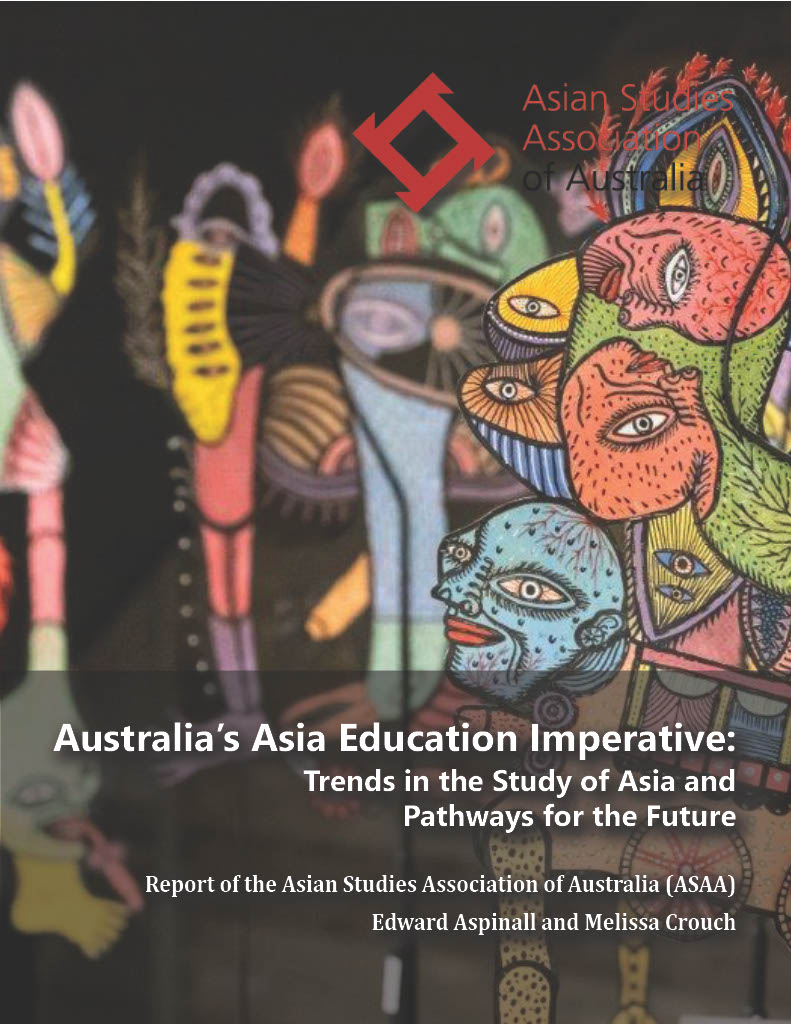Australia's Asia Education Imperative
Australia's Asia Education Imperative
For about half a century, Australia has been a global leader in the study of Asia. The Asian Studies Association of Australia (ASAA) is the peak academic association for the study of Asia in Australia. The ASAA report – Australia’s Asia Education Imperative – is the fifth ASAA report since the 1970s. The report focuses on trends in the promotion of Asia literacy in Australian universities from 2000 to 2022, outlining both achievements and challenges. While the overall picture is complex, the report identifies a decline in government and, in many cases, university support, pointing to growing challenges in Australia’s efforts to promote Asia literacy among Australian graduates at a time that Asia’s global prominence and influence is more obvious than ever. The report proposes a set of recommendations to the government and to universities in order to renew and strengthen national commitment to Asia literacy.
The ASAA’s recommendations to the government and Australian universities offer a future vision to realise Australia’s Asia education imperative in the next two decades.

Recommendations to the Federal Government
- Develop a new federal strategy on Asia literacy, including
- Convene a national summit on Asia literacy with all key stakeholders to inform and develop a new federal strategy and clear goals on Asia literacy.
- Establish a National Advisory Council on Asian Studies [or Asia literacy] with representation from academia, schools, state governments, business, and other stakeholders to advise on and monitor the attainment of Asia literacy goals.
- work with each State/Territory Government to ensure the new federal strategy can be implemented in coordination with state education policies
- Renew federal government support for Asian languages
- Restore federal funding for the teaching and learning of Asian languages in Australian schools at a level of $18 (2022 dollars) per Australian school student per year – equivalent to the level prevailing between 1995 and 2002.
- At the tertiary level, the government should establish a competitive program, open for bids by universities, to support the teaching of lesser-taught but high-priority languages like Indonesian and Hindi.
- Enhance world-leading Asia research in Australia through the Australian Research Council (ARC).
- Establish two dedicated research schemes: i) an Asian Studies Fellowship Special Research Initiative, and ii) an Asia Special Research Initiative. Criteria for both schemes would include competence in at least one Asian language, and both schemes would apply to the humanities and social sciences.
- Establish a special program based on the Centres of Excellence framework to support deep research collaboration between Australian and Asian universities in addressing major global challenges. Over a period of five to 10 years, five such Australia-Asia Collaborative Centres of Excellence could be supported, with potential for collaboration and support from partner Asian governments.
- Ensure a permanent role for Asian Studies expertise on the ARC College of Experts. The ARC should be required to ensure there is a permanent role for an Asian Studies expert with language capabilities (FOR code 449901) to assess every ARC grant round.
- Maintain support for in-country study and extend to postgraduate research in Asia
- Maintain support for in-country study in Asia for Australian undergraduate students through the New Colombo Plan, and prioritise students who are already learning an Asian language.
- Develop a new scheme (similar to the Endeavour Awards program or Prime Minister’s Australia Asia Awards) to fund six months postgraduate research in Asia and advanced language learning of Asian languages.
- Develop a national Asia collections library strategy through the National Library of Australia, in collaboration with university libraries
- The strategy should include restoring the Asia collection reading room, restoring acquisitions for all Asia collections, and hiring librarians with expertise in Asian languages to oversee the collection at the NLA.
- Create a new Prime Minister’s literary award on Asia
- Develop a book award as part of the PM’s Literary Awards to include recognition for a monograph that demonstrates excellence in Asia research.
Recommendations to Australian universities
- Develop a strategy to ensure Australian universities are global leaders in Asia literacy
- Each university must develop its own Asia Literacy and Engagement Strategy, with concrete commitments on development of Asia expertise alongside outreach, engagement, and collaboration in Asia.
- Advance Asia literacy through appointing and supporting academic leaders with the right mix of skills.
- This goal can be achieved through several steps:
- Establish permanent institutional and leadership structures to support Asia literacy (e.g. Pro Vice Chancellors (Asia), Associate Deans). Such a role should include research-led international engagement
- Ensure leadership structures support meaningful equity and diversity, particularly in relation to Asia-background academics and students
- Targeted hiring of Asia experts with relevant language skills to enhance their academic breadth, teaching offerings and supervision possibilities.
- Collaborate with Federal and State/Territory Governments on Asia literacy
- Australian universities have the opportunity to partner with the Federal and State and Territory governments to promote the study of Asia in higher education through genuine programs to deepen Asian literacy and engagement.
- Support cross-institutional consortiums for in-country programs
- Australian universities should collaborate to establish cross-institutional consortiums for in-country programs, based on the successful Australian Consortium for In-Country Indonesian Studies (ACICIS) model, to ensure that students from all universities have options for study abroad in Asia, including language programs.
- Ensure academics and students work and study in an environment committed to academic freedom as it relates to the study of Asia
- Invest international student revenue in Asian Studies
- Australian universities should invest a proportion of funds from international students back into ensuring sustainable Asian Studies and language programs prosper.

